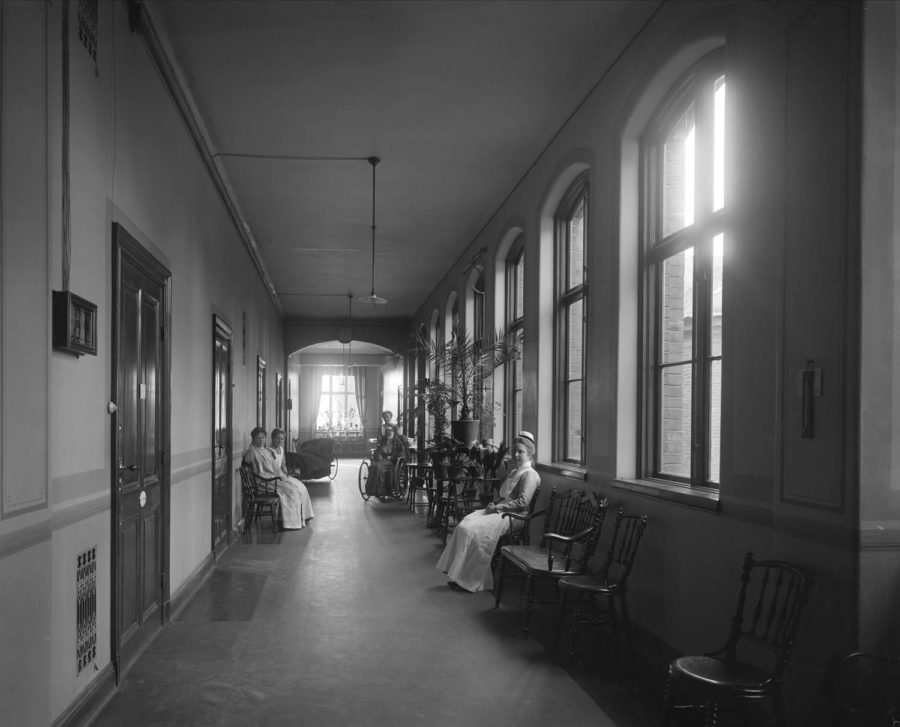White Walls – Chapter 3
November 13, 2018
Timothy found he actually quite enjoyed group therapy. Rather, he enjoyed the group leader, Tracy. She spoke with a silvery, faded accent and listened to every word, even the unspoken ones. Her hands moved in a soft, lyrical manner, like each expression required the gusto of a classical composer. She maintained a positive, kind attitude, unlike the majority of nurses at the institute. Timothy couldn’t understand how she could be so relentlessly peaceful. Her career involved listening to the darkest parts of the human mind; it ought to be terrifying.
How unfortunate, Timothy thought as he sat down, that she should be contained to a cramped, drab, blue room. Her worth surpassed fold out chairs and dingy decor.
After everything that occurred that morning, Timothy could hardly focus. This became apparent when Tracy asked him the same question for the third time.
“And how about you, Timothy?”
He fished through his brain, hoping to remember the original question. Instead, a picture of case 43’s victim came to mind, her bloodstains rising to the surface of the image like cream.
“How has your day been?” Tracy asked.
He could only think of the woman’s face. It morphed until it became that of the captain’s, but the blood remained.
Tracy cocked her head, allowing a pale brown curl to escape from her bun. She absentmindedly ran her fingers up and down the sleeves of her baby-pink sweater, anticipating his response.
The blood and faces suddenly deteriorated, as if someone poured bleach into his skull.
Tracy repeated the question again. The other patients were becoming antsy, and she used one of her gentle gestures to calm them.
Timothy considered answering ‘fine’ and allowing the circle to move on, but the last time he did that Tracy scribbled something on her clipboard and his doctor prescribed ‘more participation’.
Timothy went with “Interesting,” instead.
The corners of Tracy’s mouth turned up. If participation made her smile, it might be worth it.
As the discussion continued, Timothy began receding into the folds of his brain. He found himself unable to comprehend or process the conversation, as though his mind wanted to remain blank. He forced himself to pay attention.
“…guilt. What would you define guilt as?” Tracy asked.
“Something you feel bad about,” a man across from Timothy muttered.
Someone else chimed in, “Feeling responsible for a bad situation.”
“Mmhm.” Tracy nodded. “Now, I don’t want you to answer aloud, but I want you to think about this. Do you feel guilty?”
Timothy almost drowned in the silence. He thought he ought to feel guilty, but what for? Most people felt guilty about their pasts, and he couldn’t be sure he had one.
“Alright. Why doesn’t everyone take a turn to say something they feel guilty about? You can go into as much detail as you think is necessary.”
Tracy scrawled down a list of everyone’s answers. When she reached Timothy, he said nothing.
Tracy attempted to make him answer. “Do you feel guilt towards anything, Timothy?”
He looked straight into her eyes, two blue pills that he thought he swallowed the night before.
“I feel guilty that I don’t remember. My family, my friends, my coworkers, they all come in with something they need or want from me, but I can’t even tell them their own names. I want to help them, but I feel like I’ve done something wrong. I can’t remember, and I can’t tell them what they want to hear.”
The pills dissolved in the warmth of her eyes. She looked away to record his answer, nodding.
“So, let’s think about this. Think about the event you spoke about, the events others spoke about. What impact do these events have on our lives?”
His sister, flipping through photographs and waiting for him to jump up and say he remembered everything. Captain Dawson, searching for recognition with his desperate eyes. Timothy’s stomach sunk.
“What if I were to tell you that your guilt is not caused by those events? It is caused by something else entirely. Let’s use-” she paused to look down at her list, “Timothy as an example.”
He couldn’t decide whether to feel reassured or uncomfortable.
“Is Timothy responsible for losing his memories?” She leaned forward, projecting the question into the group.
“No,” his neighbor said, “he couldn’t control that.” The others mumbled their agreement.
“Exactly. So why is Timothy feeling guilty? Do you think you deserve your guilt, Timothy?” Tracy looked directly at him. He couldn’t escape answering.
After a few breaths, he began. “Yes, it’s my fault. I can’t be who they need me to be.”
“Did they tell you it was your fault? Or do you tell yourself it was your fault?”
He opened his mouth to respond, but realized she already knew the answer. She returned her focus to the group.
“So, what have we learned? Timothy believes he is guilty. The way he talks and treats himself convinces him he should be guilty. But we all agree he is not. If we can change the way we talk to ourselves, we can allow ourselves to feel forgiven and move past these events.”
After a long, contemplative silence, Tracy announced that if they all thought about their guilt and came up with some good reflections for next session, she would end therapy then.
“You all participated and listened today, and that is all I expect of you,” she said before standing up and beginning to fold up the chairs as each patient left.
Eventually, only Timothy and Tracy remained in the room, which seemed smaller with just the two of them. Not even a conversation filled the space.
When there was nothing left to tidy, she finally addressed him. “Do you need something, Timothy?”
He examined the creases and calluses of his hands. “I used to be a cop. And when I lost my memory, I lost the ability to help people.”
Tracy didn’t say anything. She crouched down next to his chair and placed a hand on his shoulder.
“A woman died,” he continued. “And because of me, they may never know what happened to her. Her family….It’s all my fault.”
She sighed. “Timothy, did you hit your head on purpose?”
He could feel tears welling in his eyes. “I don’t know. How could I?”
“Well, do you know what most people do? Most people do not intentionally injure themselves. Especially if they have a responsibility like solving a murder.”
He nodded and resisted the urge to cry.
“And you didn’t kill her, so how could any of this be your fault? Things happened that were completely out of your control. You might as well blame me for all of this.”
“But you didn’t do anything.”
She searched for his eyes. “Neither did you, Timothy.”
Tracy stood up and called an orderly in from the hallway. He escorted Timothy back to his room, but not before Timothy could help her put the last chair away.





